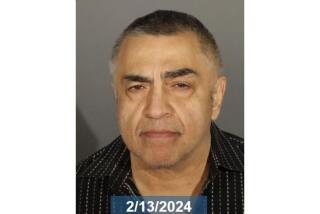Builder Convicted in Sale of Parkland to U.S.
- Share via
A federal court jury Wednesday convicted a prominent Encino developer of using a fake letter to inflate the price of a Santa Monica Mountains tract he sold to the National Park Service.
The U. S. District Court jury in Los Angeles deliberated less than two hours before convicting Jerry Y. Oren of scheming to cheat the government in the 1985 sale of 336 oak-covered acres in Agoura’s Cheeseboro Canyon.
Oren, a leading contributor to the campaigns of elected officials in Los Angeles County and the City of Los Angeles, is to be sentenced Sept. 14 by Judge Harry L. Hupp.
The developer, who turned 52 on Wednesday, could be sentenced to a maximum of 10 years in prison and $11,000 in fines. He was convicted of one count of wire fraud and one count of making a false statement in a matter within the National Park Service jurisdiction.
Radoslav L. Sutnar, a former president of the Los Angeles County Countywide Citizen’s Planning Council and a consultant to Oren in the transaction, pleaded no contest May 7 to felony wire fraud for his role in the scheme.
The case revolves around a fictitious letter that prosecutors charged Oren used to inflate the appraised value of his property before its sale.
Faked a $9.3-Million Offer
In the letter, a New York real-estate agent told Oren that Union Pacific had offered $9.3 million for the developer’s Agoura acreage.
In court, appraiser Thomas W. Erickson said he had set his $8.4-million appraisal based on the purported Union Pacific offer. A Union Pacific vice president testified that no offer was made.
An earlier appraisal put the land’s value at $5.8 million.
The tract was sold by Oren to the San Francisco-based Trust for Public Land, which was acting as intermediary for the Park Service, in January, 1985, for $7.5 million. The trust promptly resold it to the Park Service for $8 million for inclusion in the Santa Monica Mountains National Recreation Area.
In court, Oren and Sutnar each blamed the other for initiating the fake-letter scheme.
Oren also said he did not know that the letter was fictitious when he repeatedly assured Erickson that the document was valid, at a time when the appraiser was determining the land’s value.
Sutnar, on the other hand, testified that Oren and New York real-estate broker Moishe Ziv worked out terms of the Union Pacific offer in a telephone conversation that he monitored on a speaker phone.
He quoted Oren as saying, “Moishe, make it look good.”
Sutnar said that, at Oren’s direction, he took notes of the conversation.
Those notes, which he mailed to Ziv, subsequently were copied “exactly” in the text of the fake Union Pacific letter, Sutnar said.
A wire-fraud charge against Ziv was dropped in April when prosecutors said they could not prove that Ziv knew the letter was to be used illegally.
Backdating Ordered
Sutnar also testified that, after the letter arrived at Oren’s Encino office, Oren ordered him to backdate it so that it would coincide with the earliest date on which he had told trust officials he had a rival offer.
Oren acknowledged that the letter was backdated in his office, but insisted he was guilty only of a “very serious error” in allowing Sutnar to alter the document.
“Rad Sutnar walked into my office and said he wanted to change the date,” Oren said. “I had an argument with him and told him not to do it. I was busy, and finally said, ‘Oh, go ahead.’ ”
The developer said he did not think that backdating the letter would affect the purchase price. Oren said he did not suspect the letter was fake because, before receiving it, he had asked Ziv to inform him of any buyers interested in his property.
Ziv, who described himself as a “very close friend” of Oren, testified he could not recall whether it was Oren or Sutnar who asked him for the Union Pacific letter.
And he said he could not recall actually writing or reading the letter, which was signed by Daniel J. Hirsch, Ziv’s partner.
To buttress the charge that Oren was responsible for the letter, Assistant U. S. Atty. Ralph F. Hirschmann introduced hotel and telephone records showing that Oren flew to New York and talked by telephone from his hotel room to Ziv’s office at about the time secretary Susan Diller said she typed the letter about Union Pacific’s purported offer.
Hirschmann contended that, if Sutnar had executed the fake letter scheme on his own, “Oren would have discovered it immediately. . . . There is no way Mr. Sutnar could have been some kind of rogue elephant doing this on his own.”
Defense attorney Bruce I. Hochman urged jurors to remember testimony that Sutnar’s contract with Oren called for a 10% commission only if the land were sold to the trust.
Strong Motive Alleged
He contended that gave Sutnar a strong motive.
“If the deal doesn’t go through, Sutnar gets zip. But Mr. Oren gets his property back,” Hochman said.
The defense attorney also argued that appraisers normally do not consider rival offers in setting a property’s value.
The offer letter “was not something considered important by Mr. Oren,” Hochman said. “It was something to whet Erickson’s appetite to get him to find other comparable sales.”
Sutnar, whose no-contest plea is the equivalent of a guilty plea, is to be sentenced July 27.
More to Read
Sign up for Essential California
The most important California stories and recommendations in your inbox every morning.
You may occasionally receive promotional content from the Los Angeles Times.













